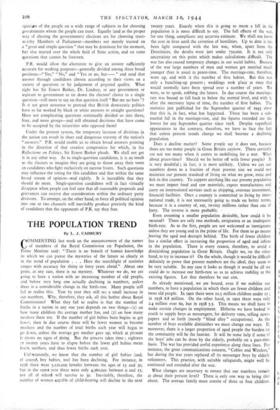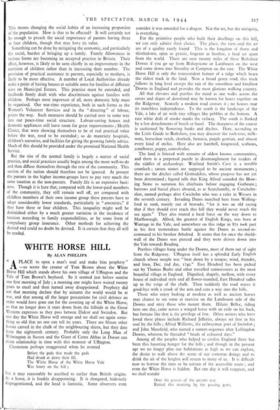THE POPULATION TREND
By L. J. CADBURY
COMMENTING last week on the announcement of the names of members of the Royal Commission on Population, the Prime Minister said : "There is no branch of human knowledge in which we can pierce the mysteries of the future so clearly as in the trend of population . . . Here the searchlight of statistics ranges with accuracy for thirty or forty years ahead." About one point, at any rate, there is no mystery. Whatever we do, we are going to have a nation with an increasing number of old people, and before very long one actually declining in numbers, unless there is a considerable change in the birth-rate. Many people 'still fail to realise this. Year by year they still see a small increase in our numbers. Why, therefore, they ask, all this bother about Royal
Commissions? What they fail to realise is that the number of births in a nation in any one year depends on two things—(t) on how many children the average mother has, and (2) on how many mothers there are. If the number of girl babies born begins to get fewer, then in due course there will be fewer women to become mothers and the number of total births each year will begin to go down, unless the average per mother goes up, which at present it shows no signs of doing. But the process takes time ; eighteen cr twenty years have to elapse before the fewer girl babies mean fewer mothers, and thus fewer births each year.
Unfextunately, we know that the number of girl babies (and, of course, boy babies, too) has been declining. For instance, in 1938 there were 5,120,000 females between the ages of 15 and 30, but in the same year there were only 4,360,000 between o and 15, not all of whoni will survive to 30. Inevitably, therefore, the number of women capable of child-bearing will decline in the next
twenty years. Exactly when this is going to mean a fall in the population it is more difficult to say. The full effects of the war,
for one thing, complicate any accurate estimate. We shall not know
the cost in lives until the cessation of hostilities. Up to date it has been light compared with the last war, when, apart from the
Dominions, the deaths were just under 750,000. It is not only uncertainty on this point which makes calculations difficult. The war has also caused temporary changes in our social habits. Because of the war large numbers of men and women got married much younger than is usual in peace-time. The marriage-rate, therefore, went up, and with it the number of first babies. But this was only a bunching-up process ; weddings took place at once that
would normally have been spread over a number of years. We were, so to speak, robbing the future. In due course the marriage.
rate was bound to fall back to below the normal level, and with it, after the necessary lapse of time, the number of first babies. The statistics just published for the September quarter of 1943 show that this is, in fact, what has happened. There has been a sub- stantial fall in the marriage-rate, apd the figures recorded are the lowest for any September quarter since 1918. Despite superficial appearances to the contrary, therefore, we have to face the fact that unless present trends change we shall become a declining population.
Does a decline matter? Some people say it does not, because there are too many people in Great Britain anyhow. There certainly are ncn too many when it comes to mobilising for a war. What about peace-time? Should we be better off with fewer people? It is very doubtful ; in fact, it is most unlikely. Unless we cut our numbers down to a fraction of their present size we could not maintain our present standard of living on what we grow, mine and fish in this country. To support anything like our present population we must import food and raw materials, export manufactures and carry on international services such as shipping, overseas investment, financial facilities. Once a country is committed to living by inter- national trade, it is not necessarily going to trade on better terms, because it is a country of, say, twenty millions rather than one of forty. The reverse is more probable. - Even assuming a smaller population desirable, how could it be secured? There are only two methods, emigration or an inadequate birth-rate. As to the first, people are not welcomed as immigrants unless they are young and in the prime of life. For them to go means ,leaving the aged and decrepit behind. The birth of fewer children has a similar effect in increasing the proportion of aged and infirm in the population. There is every reason, therefore, to avoid a diminishing population in Great Britain. Ought we, on the other hand, to try to increase it? On the whole, though it would be difficult definitely to prove that present numbers are the ideal, they seem to be very suitable. In any case it looks as though it would be all we could do to increase our birth-rate so as to achieve stability at the existing figures. Let that therefore be our aim.
As already mentioned, we are bound, even if we stabilise our numbers, to have a population in which there are fewer children and more old people. In 1901 there were 10.5 million children under x5 ; in 1938 8.8 million. On the other hand, in 19ot there were only 2.4 million over 60, but in 1938 5.5. This means we shall have to make certain changes in employment. Hitherto we have looked to youth to supply boys as messengers, for delivery vans, selling news- papers and so forth (mostly "blind alley" occupations). As the number of boys available diminishes we must change our ways. If, moreover, there is a larger proportion of aged people the burden on the community will be the heavier. It will be some help if some of the boys' jobs can be done by the elderly, probably on a part-time basis. The war has provided useful experience along these lines. For instance, the great communications concern, "Cables and Wireless," has during the war years replaced all its messenger boys by elderly volunteers. This practice, with suitable safeguards, might well be continued and extended after the war.
What changes are necessary to ensure that our numbers remain at about their present level? There is only one way to bring that about. The average family must consist of three or four rhildren. This means changing the social habits of an increasing proportion of the population. How is that to be effected? It will certainly not be enough to preach the social importance of parents having three or four children, though that may have its value.
Something can be done by mitigating the economic, and particularly the social, burden of bringing up a family. Family Allowances in various forms are becoming an accepted practice in Britain. Their effect, however, is likely to be seen chiefly in an improvement in the nutrition of children rather than in increasing their number. The provision of practical assistance to parents, especially to mothers, is likely to be more effective. A number of Local Authorities already make a point of having houses at suitable rents for families of different sizes on Municipal Estates. This practice must be extended, and landlords firmly dealt with who discriminate against families with children. Perhaps most important of all, more domestic help must be organised. Our war-time experience, both in such forms as the Women's Volunteer Services and in the " directing " of labour, points the way. Such measures should be carried over in some way into our peace-time social structure. Labour-saving houses and domestic appliances still leave room for great improvements ; Health Clinics, that were showing themselves to be of real practical value before the war, need to be extended ; so do maternity hospitals, children's nurseries, and facilities for giving the growing family advice. Much of this should be provided under the promised National Health Service.
But the size of the normal family is largely a matter of social practice, and social practices usually begin among the more well-to-do and then diffuse themselves through the rest of the community. This section of the nation should therefore not be ignored. At present the parents in the higher income-groups have to pay very much the same taxation as the non-parents. Family life is an expensive busi- ness. Though it is here that, compared with the lower-paid members of the community, they still remain well off, yet compared with childless members of their own income group these parents have to adopt considerably lower standards, particularly in "amenities," if they have three or four children. This inequality might well be diminished either by a much greater variation in the incidence of taxation according to family responsibilities, or by some form of compulsory group insurance. Other methods for achieving the desired end could no doubt be devised. It is certain that they all will be needed.



























 Previous page
Previous page